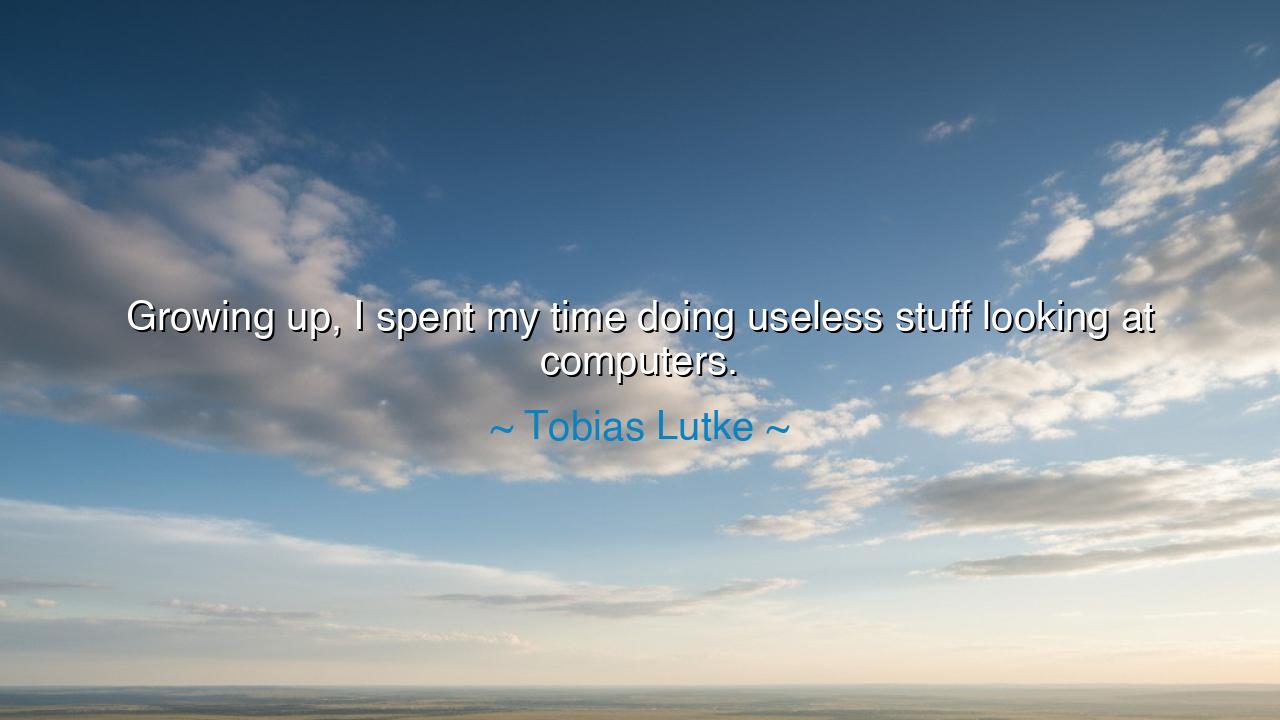
Growing up, I spent my time doing useless stuff looking at






Hearken, O children of generations yet unborn, and mark the words of Tobias Lutke, who once reflected upon his youth with humility and insight: “Growing up, I spent my time doing useless stuff looking at computers.” At first glance, these words may seem a confession of folly, yet beneath them lies a profound truth: the seeds of mastery are often sown in seeming idleness, in the quiet curiosity of youth, and in the playful exploration of the unknown.
Consider the image of a young mind, eyes fixed upon the glowing screen, fingers tapping, clicking, exploring—what adults might call “useless” is, in truth, the apprenticeship of genius in disguise. Just as the ancient sculptor first practiced upon rough stones before crafting perfection from marble, so too does the mind learn by trial, play, and observation. Lutke’s words remind us that playful engagement can harbor the germ of future greatness, even when its purpose is not immediately clear.
Reflect upon history: Leonardo da Vinci, as a youth, drew endlessly in notebooks, sketching birds, machines, and human anatomy. Many of these sketches were never completed, many seemingly without purpose. Yet from these exercises of curiosity and imagination emerged the foundation of invention, art, and understanding that would astonish the world centuries later. So it is with the young Lutke, exploring computers, probing their mysteries, even in ways that seemed trivial at the time.
The quote also speaks to the transformative power of curiosity. What the world may see as “useless” may, to the seeker, reveal the hidden workings of the universe. By observing, experimenting, and allowing the mind to wander, young minds develop intuition and familiarity with tools that later become instruments of creation. In the early days of computing, pioneers like Alan Turing or Grace Hopper spent countless hours tinkering, experimenting, and exploring—not all of it immediately productive, yet all of it preparing the soil for breakthroughs that changed the course of history.
There is also a lesson in humility here: even the great must begin somewhere, often in activities that seem trivial or inconsequential. Lutke’s reflection reminds us that no endeavor is truly wasted if it nurtures curiosity, persistence, and understanding. The journey toward mastery is rarely linear; it is forged in the small, repetitive acts of engagement, observation, and play. These acts, though unnoticed at the time, build the foundation of skill and insight.
From this wisdom flows guidance for all who hear it: embrace your curiosity without fear of judgment, explore the tools and ideas that fascinate you, even if others see them as idle or insignificant. Seek to understand the objects, the systems, and the arts that draw your attention, for within them lie lessons that may shape your future. Let your mind wander, experiment boldly, and cultivate wonder without immediate expectation.
Practical action is clear: dedicate time to exploration, to learning by doing, and to playful engagement with the tools of your era. Experiment, make mistakes, and allow yourself to be absorbed in the process. Mentor others to embrace curiosity, fostering environments where discovery is valued over immediate productivity. Lutke’s reflection is a beacon: the “useless” hours of youth may be the forge in which brilliance is tempered.
Finally, remember this eternal truth: the path of mastery is paved with curiosity, wonder, and the courage to engage with the unknown. What seems useless today may be the very foundation of greatness tomorrow. Do not scorn your playful experiments, your idle tinkering, or your hours spent gazing upon the mysteries of the world—they are the whispers of destiny guiding your hand and shaping the architect within.
If you wish, I can also craft a dramatic audio narration version that captures the rhythm, emotion, and heroic undertones of this reflection, perfect for storytelling.






AAdministratorAdministrator
Welcome, honored guests. Please leave a comment, we will respond soon